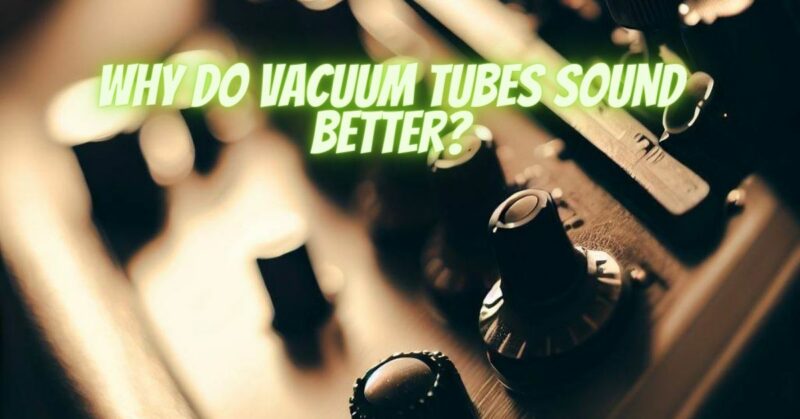The debate over whether vacuum tubes sound better than solid-state amps has been going on for decades. There is no scientific consensus on the matter, but there are a few reasons why some people believe that vacuum tubes have an edge in terms of sound quality.
Nonlinear distortion: Vacuum tubes produce nonlinear distortion, which means that they add harmonics to the original signal. These harmonics add richness and fullness to the sound. Solid-state amps, on the other hand, produce linear distortion, which is often described as sounding harsh or metallic.
Tone controls: Vacuum tubes often have more tone controls than solid-state amps. This gives users more control over the sound of their music. They can use the tone controls to adjust the bass, treble, and midrange frequencies to their liking.
Warmth and fullness: Vacuum tubes are said to have a warmer, fuller sound than solid-state amps. This is because tubes produce harmonics, or overtones, that add richness and depth to the sound. Solid-state amps, on the other hand, are more analytical and tend to sound thinner and brighter.
Character: Vacuum tubes are said to have a certain “character” or “mojo” that solid-state amps don’t have. This is difficult to define, but it is something that many people appreciate.
Of course, there are also some disadvantages to vacuum tubes. They are more expensive than solid-state amps, and they require more maintenance. Tubes also have a shorter lifespan than solid-state components.
However, for many people, the advantages of vacuum tubes outweigh the disadvantages. They believe that vacuum tubes produce a more natural and musical sound.
Ultimately, the decision of whether to use a vacuum tube amp or a solid-state amp is a matter of personal preference. There is no right or wrong answer. If you are looking for the best possible sound quality, then you should try out both types of amps and see which one you prefer.
Here are some additional things to keep in mind about vacuum tubes and sound quality:
-
The type of tube: The type of tube used can affect the sound quality. For example, some tubes are known for their warm, full sound, while others are known for their clarity and precision.
-
The quality of the tube: The quality of the tube can also affect the sound quality. Higher-quality tubes are typically made with better materials and have a longer lifespan.
-
The age of the tube: The age of the tube can also affect the sound quality. Older tubes may have a warmer, richer sound, while newer tubes may be more accurate and precise.
-
The amp: The amp that the tube is used in can also affect the sound quality. Some amps are better suited for certain types of tubes than others.
If you are interested in learning more about vacuum tubes and sound quality, there are many resources available online and in libraries. You can also talk to other audiophiles to get their recommendations.
However, it is important to note that there is no scientific evidence to support the claim that vacuum tubes sound better than solid-state amps. The perceived difference in sound quality is likely due to a combination of factors, including the nonlinear distortion produced by vacuum tubes, the tone controls available on many vacuum tube amps, and the personal preferences of the listener,


